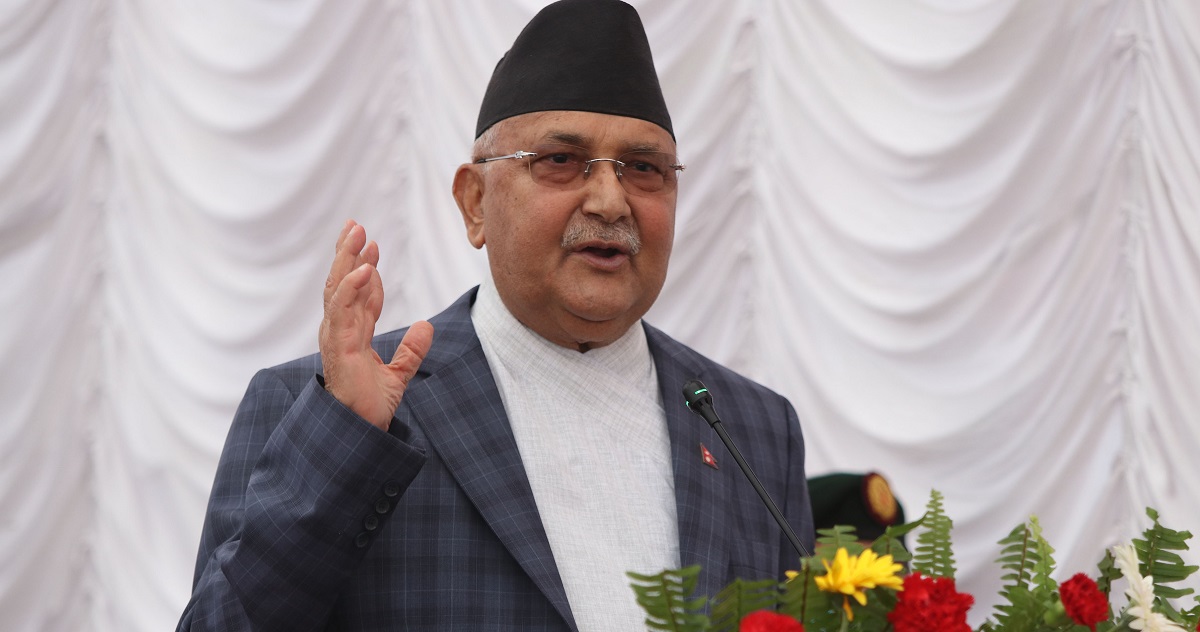KATHMANDU: A ‘pompous’ Prime Minister KP Oli, probably, never had thought he would be compelled to bow down to pressure from all quarters when he brought two ordinances, hastily, on Monday.
PM Oli, this week, courted controversies in the political spectrum. Yes, he did not listen to anybody. This is an allegation from his confidantes.
Political pundits, meanwhile, have to say that PM Oli’s hasty move came amid rumors that preparations (inside the ruling Nepal Communist Party) were on to replace him with senior leader Madhav Kumar Nepal.
Petrified with this, PM Oli might have taken the futile move to keep his rivals in check, perhaps due to the deepening rift among the top rung leaders within the party.
This means that PM Oli decided to introduce the ordinance so that he could shield himself even if his party underwent a crisis. He, however, had to recoil from his decision by withdrawing the ordinances on Friday afternoon.
In a total contrast to what a civilized society or an advanced progressive country experiences in the form of political transparency, the country and its people had to undergo a glimpse of the crude Nepali politics when the government itself tried to bulldoze politicians of a particular party to join the government.
PM Oli, meanwhile, had confided with some of his close aides that the ordinance had not been clearly communicated with the party top brass. A question: Why did he need the communication when the ordinance was targeted against NCP Chairman Pushpa Kamal Dahal and senior leader Nepal?
There have been reports that differences between Oli and Dahal have exacerbated in recent times.
However, if PM Oli’s statement while bringing the ordinance is to be recalled, he had very candidly stated that it was aimed at splitting the Samajbadi Party Nepal.
He intended to split the Samajbadi Party and lure some of the lawmakers to join his government if Dahal camp planned to oust him. However, Oli’s move ricocheted instead as the Samajbadi Party and Rastriya Janata Party merged on Wednesday midnight to form Janata Samajbadi Party without giving a hint to him or his confidantes.
PM Oli’s efforts to split the Samajbadi Party, political observers argue, ended in a whimper giving a shock to PM Oli.
On the other hand, Oli, meanwhile, had full knowledge of the fact that Dahal-Nepal camp enjoyed a clear majority in the nine-member powerful Secretariat, and the party’s central committee even though Oli boasted of over 40 percent in the parliamentary party (PP).
The ordinance, therefore, was brought to pave the way for him to split the party with the support of the PP if Dahal and Nepal decided to oust him.
However, his plan exposed instantly, and claims can be fact-checked. Time will tell.
If the ordinance related to the amended Political Party Act not revoked, it would have allowed leaders of a political party to split the party if they garner 40 percent support either in the parliamentary party or the central committee.
PM Oli, however, was not prepared to give up his haughtiness. For instance, consider what he told Dahal on Thursday morning: “I did not bring the ordinances with bad intent.”
This means that PM Oli still considers that he was treading on the right path.
He, would perhaps, not taken his decision back had Dahal and party senior leader Nepal not ‘suggested’ him to roll back the decision. Furthermore, the Prime Minister was under immense pressure from the NCP Standing Committee members.
“I will withdraw the ordinances if you all think it wise to do so,” a party source quoted PM Oli as saying to Chairman Dahal earlier on Thursday.
The Cabinet meeting at Baluwatar on Monday had passed an ordinance allowing a party to split with the support of 40 percent in either the parliamentary party or the central committee.
The Act about political parties requires the support of 40 percent in both the parliamentary party and the central committee to split a political party.
The government’s attempts having failed indicates that such plans are damaging to the spirit and essence of democracy.
It cannot be denied that the use of the state police to force politicians to break and join parties is the worst kind of harassment a state can cause, say political analysts.
With govt becoming increasingly autocratic and narrow minded such incidents would be on the rise where retired and aspiring police officers might find re employment. This is indeed heading towards a police state.
In a total contrast to what a civilized society or an advanced progressive country experiences in the form of political transparency, the country and its people had to undergo a glimpse of the crude Nepali politics when the government itself tried to bulldoze politicians of a particular party to join the government.









Comment